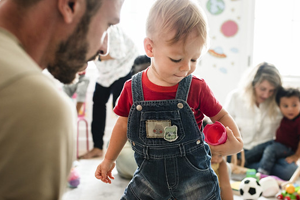
Parent survey shows benefits and challenges of funded childcare policy
The Department for Education has published the findings from its latest survey of parents. The survey showed that more children aged 0-4 were using formal childcare (64%) compared to the year before (63%). It also showed that 96% of parents were satisfied with the funded two-year old places and more parents rated the quality of childcare as good.
The study also suggests that, as funded childcare offers were increased, the proportion of mothers who reported as not working fell from 34% in 2014 to 28% in 2023 and 26% in 2024.
Responding to the survey findings, Tim McLachlan, Chief Executive of National Day Nurseries Association (NDNA), said: “These statistics show that the Government’s roll-out of more funded childcare hours is benefiting parents, who are working more hours, are satisfied with their childcare provider and fewer report difficulties meeting their childcare costs.
“Parents recognise the importance of high-quality provision for their children and particularly value staff knowledge and qualifications. At the same time, the majority understand the need for additional charges for nurseries to remain sustainable.
“As a result of consistent underfunding, nurseries have to charge parents for items such as food and consumables, which are explicitly not covered by government funding. More than 90% of parents say that these charges are not a barrier to taking up additional funded hours.
“Unfortunately in areas of deprivation, where providers are more reliant on Government funding and more likely to close, fewer parents take up the offer and more struggle with costs. Evidence shows that children in these areas have the most to gain from accessing high quality early education and care.
“We are still very concerned that half of the parents whose child has additional needs find it difficult to secure a place. Getting this support right and securing early intervention can make a life changing difference to children and their families.”
Further findings from the survey:
- 64% of children aged two use formal childcare (58%)
- 96% parental satisfaction for funded two-year old places (89%)
- 59% said that funded places for two-year olds gives more work flexibility
- 72% parents 0 – 4 rate quality as good (71%)
Maternal employment
- 64% mothers reliable childcare helped them find work (66%)
- % not working reduced 34% (2014) to 26% (2024) – but was 28% in 2023
- Just under two thirds (64%) of parents who were not using childcare said this was because they would rather look after their child(ren) themselves (an increase from 55% in 2023)
- There was a 4% fall in the parents who say they cannot afford childcare as a reason not to take it up between 2023 & 2024
- The most important factor for perceived quality was activities that encourage the child to socialise with other children (55%, in line with 53% in 2023), having staff that are qualified for their role (32%, in line with 31% in 2023) and the childcare or activity being affordable (31%, in line with 32% in 2023)
Deprivation:
- 75% of children aged 0 to 4 years living in the least deprived areas received formal childcare compared to 56% in the most deprived areas
- 80% of children aged between 0 and 4 years in families with an annual gross income of £65,000 or more received formal childcare, compared to 49% of those in families with an annual gross income of under £20,000
Charges:
- Over four in five (84%) parents knew providers could charge for meals and consumables, in line with 2023 (85%).
- 14% of parents said that charges had stopped them from applying to a provider and around one in ten (9%) said that it had stopped them from applying for more free hours
- Parents in families with an annual income under £20,000 were less likely to be aware of these charges than those with an annual income of between £45,000 and £64,999 (71%, compared to 84%) or with an annual income of £65,000 or more (71%, compared to 89%).
Waiting lists:
- Just under a sixth (14%) of parents whose children are currently using formal childcare are also on a waiting list for another childcare provider
- Just over a quarter (26%) of parents whose children are not currently using formal childcare are currently on a waiting list for a childcare provider.
SEND
- Just under half (48%) of parents using a formal childcare provider reported finding it difficult or very difficult to find a local provider that could cater for their child’s special educational, health or disability – a rise from 29% in 2023.
- 94% of parents whose children were receiving support for a special educational need or had a long-standing physical or mental impairment, illness, or disability did not pay any money to their formal provider to support their child’s needs whereas 6% did
- England
Similar Articles
More to do to make childcare funding fairer in Scotland

EPI report: Absence rates are increasing among youngest children


